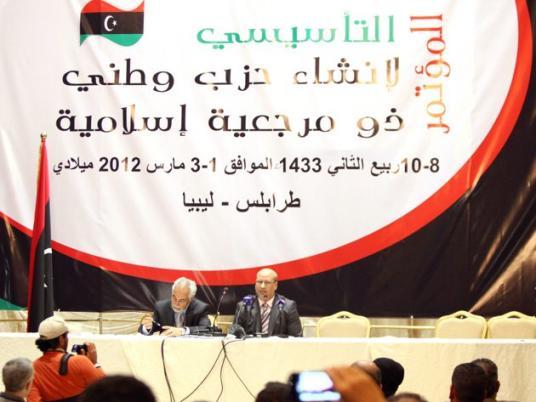
Libyan Islamists and independents have formed a new political party and elected a representative of the Muslim Brotherhood on Saturday as its leader after a three-day conference, an AFP reporter said.
Mohammed Sawan, an ex-political prisoner under the regime of dead dictator Muammar Qadhafi who outlawed the formation of political parties as an act of treason, was elected Justice and Construction party leader by 51 percent of those present.
"I have real mixed feelings because I was imprisoned under Qadhafi for my attempts to create a political party, and I am grateful to the people here who have placed their trust in me," Sawan told AFP.
The meeting in the capital brought together hundreds of people keen to take part in the launch of the new party.
Votes were taken on a wide range of issues, including the party's name, by a show of hands.
The party's program is still under discussion, but Muslim Brothers, Islamists and independents came together for the conference with the shared aim of forming a "national party with an Islamic frame of reference."
"We aim for diversity and a state of law where differences in opinion are respected," Sawan said.
There may be no law governing the formation of political parties in the new Libya, but political associations and coalitions are forming at a rapid pace.
In a country where political organizations of any kind were banned for decades under the iron-fisted rule of Qadhafi, who was toppled and killed in last year's popular uprising, these are crucial steps on the path to political development.
"Everything about this party is based on the democratic principle," said Nizar Kawan, one of the conference's organizers.
The actual process of voting moved some men present to discreet tears.
"We have created a new era in Libya by electing a party leader democratically," said Khalil Sawalim, a UK-based rights activist.
Since the start of the so-called Arab Spring, elections in the region have benefited Islamists, including in Egypt, Libya's neighbor to the east, and in Tunisia to the west.
Similar outcomes are expected in June when the North African nation, which often emphasizes its all-Muslim and moderate identity, is due to elect a constituent assembly.
"We are all Islamists and we want Libya to be at the summit of developed nations," Majida Fallah, a party activist, told a jubilant crowd in which dozens of women were present but who still comprised a clear minority.
Sawan said he expected women to play a prominent role in the Justice and Construction party because women already play an active role in civil society and "more than 100 women's groups" helped put together the three-day event.
"We believe women can run in elections and have all their rights," he said.
Abla Zeinab, part of a Tarhuna-based women's association, said the nascent party appealed to her because of the involvement of well-known personalities such as its elected leader.
"These people simply convince me," she said, adding that women across the country have the same rights and responsibilities as men.
Most of Libya's emerging parties emphasize Islam as a source of legislation, but Osama Mohammed, also from Tarhuna, said this party stood out because of the role it gives to Islamic law and the process of Shura, or consultation.
"All Libyans are Muslims, but Sharia is the common denominator through which we can settle our differences," he said.




